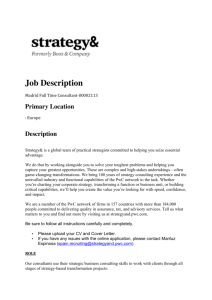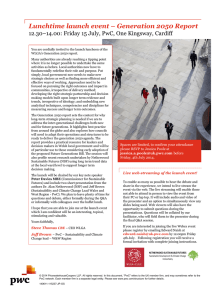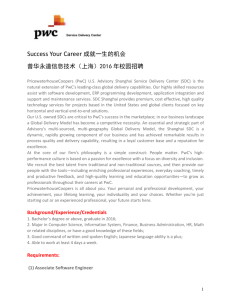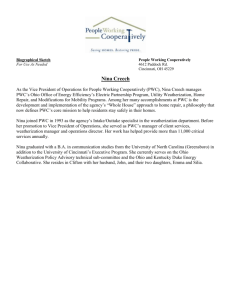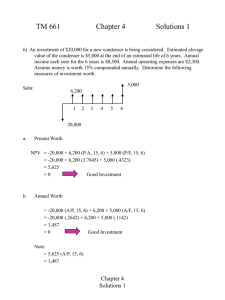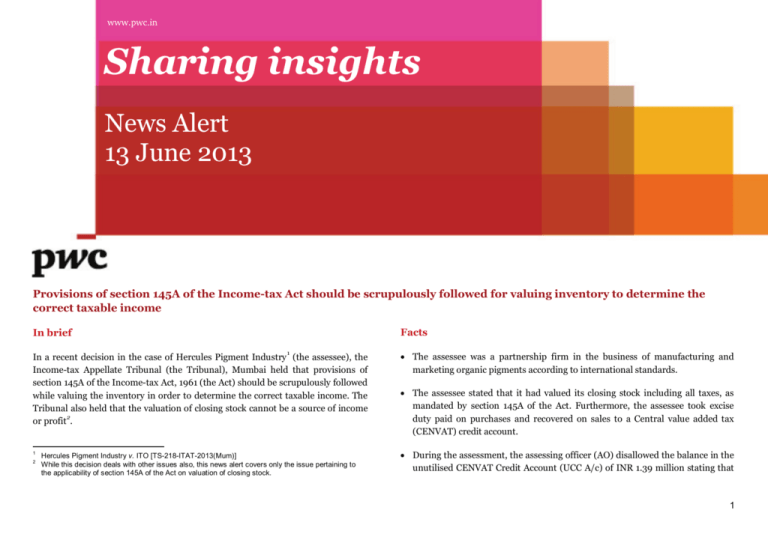
www.pwc.in
Sharing insights
News Alert
13 June 2013
Provisions of section 145A of the Income-tax Act should be scrupulously followed for valuing inventory to determine the
correct taxable income
Facts
In brief
1
In a recent decision in the case of Hercules Pigment Industry (the assessee), the
Income-tax Appellate Tribunal (the Tribunal), Mumbai held that provisions of
section 145A of the Income-tax Act, 1961 (the Act) should be scrupulously followed
while valuing the inventory in order to determine the correct taxable income. The
Tribunal also held that the valuation of closing stock cannot be a source of income
2
or profit .
1
2
Hercules Pigment Industry v. ITO [TS-218-ITAT-2013(Mum)]
While this decision deals with other issues also, this news alert covers only the issue pertaining to
the applicability of section 145A of the Act on valuation of closing stock.
• The assessee was a partnership firm in the business of manufacturing and
marketing organic pigments according to international standards.
• The assessee stated that it had valued its closing stock including all taxes, as
mandated by section 145A of the Act. Furthermore, the assessee took excise
duty paid on purchases and recovered on sales to a Central value added tax
(CENVAT) credit account.
• During the assessment, the assessing officer (AO) disallowed the balance in the
unutilised CENVAT Credit Account (UCC A/c) of INR 1.39 million stating that
1
PwC News Alert
June 2013
it had an impact on the valuation of inventory according to section 145A of the
Act.
•
On appeal, the Commissioner of Income-tax (Appeals) (CIT(A)) confirmed the
order of the AO. However, the CIT(A) allowed relief of INR 0.339 million to
the assessee.
•
The assessee appealed against the CIT(A) order before the Tribunal, Mumbai.
Tribunal Ruling
•
Section 145A of the Act is only an accounting prescription which is consistent
with the accepted accounting principles of valuation of inventories. The
valuation of inventories is relevant because they help in determining the
correct profit and they cannot be a source of income or profit.
•
CIT(A) has not allowed relief to the assessee on account of unutilised CENVAT
credit but only directed adjustments to the extent that excise duty is included
in the valuation of closing stock.
•
The Tribunal referred to the Supreme Court of India (the SC) rulings in
3
4
Chainrup Sampatram , Chowringhee sales Bureau Pvt. Ltd. and Sinclaire
5
Murray & Co. Pvt. Ltd. , wherein it was held that it was the nature and quality
of receipts or payments that are relevant in determining its taxability, and not
its accounting treatment.
Issues before the Tribunal
•
Whether the assessee has correctly determined the profit and the operating
results for the relevant assessment year irrespective of following the exclusive
or inclusive method of accounting?
Assessee’s contentions
•
The assessee has followed the inclusive method of accounting as mandated by
section 145A of the Act and hence there should not be any enhancement or
change in income.
•
The assessee has not followed the accounting treatment as prescribed by
section 145A of the Act, as the purchases were not accounted for at gross of
duties but were taken into a separate account called UCC account.
•
The amount outstanding in the unutilised CENVAT credit account (UCC
account) in the books of accounts is a different aspect of the matter and need
not be correlated with section 145A.
•
If the books are maintained on an exclusive basis, i.e. recording payment or
recovery of duties in a separate account, then a separate profit and loss
account in terms of section 145A of the Act should be prepared for tax
purposes.
•
The Tribunal referred to the SC ruling in Indo Nippon Chemicals Co. Ltd.
wherein it was held that the assessee could follow any of the two methods, i.e.
gross or net method of accounting, for reporting taxable profits, provided they
lead to the same results and pass the test of under section 145A of the Act. This
Revenue’s contentions
•
According to section 145A of the Act, the profit disclosed by the assessee
should be enhanced by the amount outstanding in the unutilised CENVAT
credit account.
•
The CIT(A) has already allowed relief to the extent that the assessee could
ostensibly show a double effect
3
4
5
6
6
Chainrup Sampatram v. CIT [1953] 24 ITR 481 (SC)
Chowringhee sales Bureau Pvt. Ltd. v. CIT [1973] 87 ITR 542 (SC)
Sinclaire Murray & Co. Pvt. Ltd v. CIT [1974] 97 ITR 615 (SC)
CIT v. Indo Nippon Chemicals Co. Ltd [2003] 261 ITR 275 (SC)
2
PwC News Alert
June 2013
was reiterated by the SC in the case of Shri Ram Honda Power Equipment
7
Ltd. wherein it was held that both the gross method and the net method were
at par.
•
Only adopting all figures at the correct values would lead to the correct profit
as per section 145A of the Act. The balance in UCC account could not be taken
as a surrogate measure of excise component in the inventories, since it did not
represent the un-utilized credit available on goods held as stock in trade. It
allows full adjustment of the excise liability on the removal of goods. Hence,
the UCC account thus prepared was not consistent with the accounting
principles.
•
The assessee needs to draw a profit and loss statement in accordance with
section 145A of the Act, confirming that the amount of excise duty is included
in the value of opening stock, purchases and closing stock in such a way that
the CENVAT credit account is effectively incorporated in the profit and loss
account and correct profit has been determined.
8
•
The Tribunal has examined in detail the difference between the gross basis
and the net basis of accounting in terms of section 145A of the Act.
•
Recommending a periodic reconciliation between accounts and excise records,
the Tribunal has reiterated the primacy of section 145A of the Act.
•
The provision becomes tax neutral only when duty is paid on value addition.
8
Also, in Raj Petro Specialties Pvt. Ltd. , the Tribunal held that sections 43B
and 145A of the Act were non-obstante provisions and were to be read in
harmony, there being no conflict between these two sections. Therefore, any
deduction in respect of excise duty payable to the central government on value
addition will only be on actual payment according to section 43B of the Act.
•
7
Conclusion
CIT v. Shri Ram Honda Power Equipment Ltd. [(2013) 258 CTR 329 (SC)]
Raj Petro Specialties Pvt. Ltd. [ITA 7260&7261/Mum/2010 dated 15 March 2013]
3
PwC News Alert
June 2013
About PwC
PwC* helps organisations and individuals create the value they’re looking for. We are a network of firms in 158 countries with more than 180,000 people who are committed
to delivering quality in assurance, tax and advisory services.
PwC India refers to the network of PwC firms in India, having offices in: Ahmedabad, Bangalore, Chennai, Delhi NCR, Hyderabad, Kolkata, Mumbai and Pune. For more
information about PwC India's service offerings, please visit www.pwc.in.
*PwC refers to PwC India and may sometimes refer to the PwC network. Each member firm is a separate legal entity. Please see www.pwc.com/structure for further details.
Tell us what matters to you and find out more by visiting us at www.pwc.in.
Our offices
Ahmedabad
Bangalore
Chennai
Hyderabad
Kolkata
President Plaza, 1st Floor Plot No 36
6th Floor, Millenia Tower 'D'
8th Floor, Prestige Palladium Bayan
#8-2-293/82/A/113A Road no. 36,
56 & 57, Block DN.
Opp Muktidham Derasar
1 & 2, Murphy Road, Ulsoor,
129-140 Greams Road,
Jubilee Hills, Hyderabad 500 034,
Ground Floor, A- Wing
Thaltej Cross Road, SG Highway
Bangalore 560 008
Chennai 600 006, India
Andhra Pradesh
Sector - V, Salt Lake.
Ahmedabad, Gujarat 380054
Phone +91-80 4079 7000
Phone +91 44 4228 5000
Phone +91-40 6624 6600
Kolkata - 700 091, West Bengal, India
Telephone: +91-033 - 2357 9101/4400 1111
Phone +91-79 3091 7000
Fax: (91) 033 - 2357 2754
Mumbai
Gurgaon
Pune
For more information contact us at,
PwC House, Plot No. 18A,
Building No. 10, Tower - C
GF-02, Tower C,
pwctrs.knowledgemanagement@in.pwc.com
Guru Nanak Road - (Station Road),
17th & 18th Floor,
Panchshil Tech Park,
Bandra (West), Mumbai - 400 050
DLF Cyber City, Gurgaon
Don Bosco School Road,
Phone +91-22 6689 1000
Haryana -122002
Yerwada, Pune - 411 006
Phone : +91-124 330 6000
Phone +91-20 4100 4444
For private circulation only
This publication has been prepared for general guidance on matters of interest only, and does not constitute professional advice. You should not act upon the information contained in this publication without obtaining specific professional advice. No
representation or warranty (express or implied) is given as to the accuracy or completeness of the information contained in this publication, and, to the extent permitted by law, PwCPL, its members, employees and agents accept no liability, and disclaim
all responsibility, for the consequences of you or anyone else acting, or refraining to act, in reliance on the information contained in this publication or for any decision based on it. Without prior permission of PwCPL, this publication may not be quoted in
whole or in part or otherwise referred to in any documents.
©2013 PricewaterhouseCoopers. All rights reserved. "PwC", a registered trademark, refers to PricewaterhouseCoopers Private Limited (a limited company in India) or, as the context requires, other member firms of PricewaterhouseCoopers International
Limited, each of which is a separate and independent legal entity.
4

